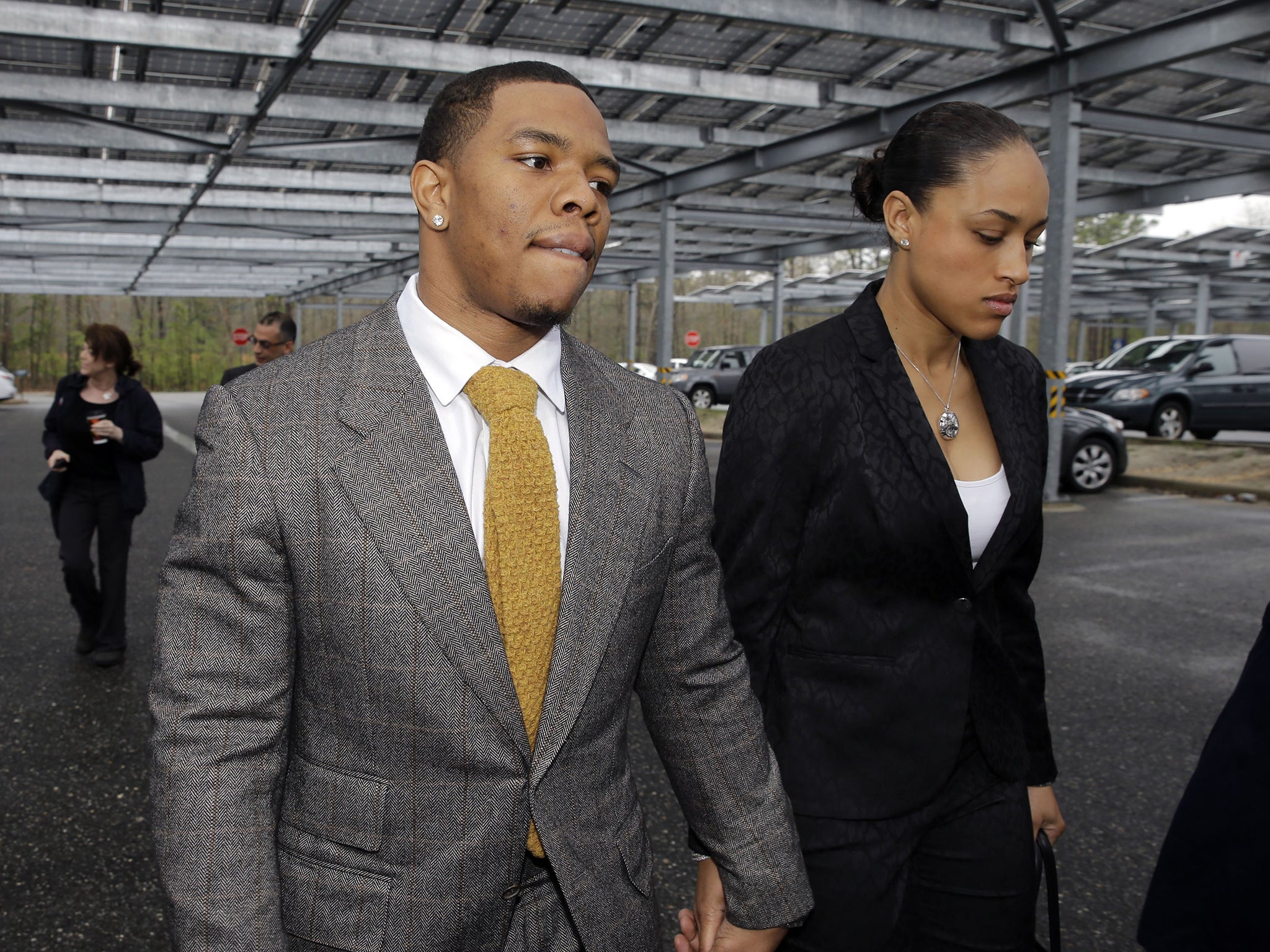Ray Rice, domestic violence and the riddle of wives who stand by the men who abuse them
UK women will be assaulted 35 times before calling police

It was just a few weeks after getting married that Sonia’s husband perforated her ear drum. A few months later, he punched her father in the face during an argument about the television remote – and went on to beat her time and time again. Yet their marriage lasted for 12 years. Sonia told her family he was “just a macho man” and rationalised his actions by telling herself that “no one had taught him to behave better, I thought that was my job”.
Many people would be surprised at her sentiments and how she could continue in the relationship. But other survivors of domestic violence who like Sonia have felt the need to defend abusive partners will relate to Janay Rice.
Footage came to light showing Ms Rice being knocked unconscious in a lift in February by her fiancé, former American football star Ray Rice. This week the National Football League decided to suspend him. But just hours after their announcement, Ms Rice stood up for her husband – they had since married, a day after he was indicted for assaulting her – saying online that the NFL took action only to boost ratings.
“[I feel] like I am mourning the death of my closest friend,” she wrote. “To take something away from the man I love that he has worked his a** off for his whole life is just horrific.”
Sonia can sympathise. “Looking back, I can see our relationship dynamic was more mother-child than husband-wife,” she says. “I had this unconditional love for him.” The 48-year-old was married to her husband for 12 years, before divorcing him and changing her name three years ago – after he strangled her in front of their two children and left her for dead.
“When we first met he told me about how badly his parents had treated him. He induced so much sympathy that all I could see was this broken little boy. He’d beat me and his childhood was the excuse, he’d cry about how his father beat him. When people criticised him I’d stick up for him like you would for a little kid.”
According to the national domestic violence charity Refuge, on average a female domestic violence victim is assaulted 35 times before her first call to police. Karen Ingala Smith, the chief executive of the domestic violence support charity NIA Ending Violence, says “the switch” that perpetrators make between being “abusive and vulnerable” is what keeps women in relationships for so long.
“There are so many threats of ‘If you leave I’ll kill you’, ‘I’ll take the kids’, ‘I’ll report you to social services’, ‘You’ll have no money’. She starts to believe all that,” Ms Smith says of the victims. “Coming up with reasons for the perpetrator’s behaviour can give the victim some mental control of the situation, even when physically they feel they have none.”
Amy, 32, began a nine-year relationship when she was 21. She says her boyfriend “completely stamped out her voice”, to the point where she couldn’t decide what groceries to buy after leaving him.
“His voice became my voice, even in my own head I heard his choices,” she says. “I couldn’t wear nail varnish, he decided my hair colour would be brown not blonde, he chose my clothes. He banned me from wearing jumpers, even in the winter. Hitting me was just the physical stuff. I had no thoughts in the end, my own thinking had been ground out of me. So when I justified him to friends it was his voice in my mouth again.”
She also made excuses for his violence to avoid being labelled “a bad mum keeping my children with a bad dad”.
“In the early days, I thought if I could normalise his behaviour it would normalise our family again, and my children wouldn’t be labelled as coming from a dysfunctional family. He stopped me working, but I said he was an assertive ‘man of the house’ rather than a bully, because male aggression is acceptable when it’s seen as being a good provider.”
The charity Solace Women’s Aid published research in June showing over 90 per cent of women who flee a violent partner experience abuse after leaving. Professor Liz Kelly, director of the Child and Woman Abuse Studies Unit at London Metropolitan University, who helped conduct the research, says the threat of post-relationship violence, cuts to legal aid and to funding for domestic violence refuges all keep women in dangerous relationships. “Society should not be asking: ‘Why does she stay?’ It should be ‘Why does he do that?’ and ‘Why does she have nowhere to go?’.”
